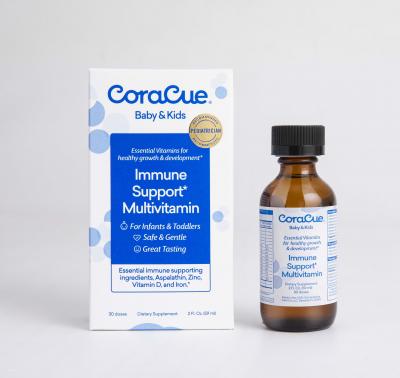Essential Vitamins for Digestive Health

The digestive system is a crucial system of the body. Your gut is made up of trillions of microorganisms and their genetic material that lives in your intestinal tract. The microorganisms are involved in many bodily functions like digestion, metabolism, weight management and immune functions.
If you’re trying to improve you or your family’s immune, help stress response, manage anxiety and depression or any other immune function, look to vitamins to help boost gut health.
“Essential” vitamins are called that for a reason. Your body needs vitamins to function properly, and the digestive system is no exception. Certain vitamins are more important than others for digestion and you can usually get them by following a balanced diet or supplementing with a daily multivitamin, like CoraCue Immune Support* Multivitamin.
Read on to learn which vitamins are essential for healthy digestion:
Vitamin D
Vitamin D helps the body absorb calcium and is essential to house your muscles, nerves, and immune system function. Healthy levels of vitamin D are associated with a reduced risk for colon cancer, according to a 2015 study.
The three ways to get vitamin D are sun exposure, supplements, and foods rich in vitamin D like egg yolks, saltwater fish, liver and fortified milk and cereals.
Vitamin A
Boost vision, bone, reproductive health and help your immune system with vitamin A. Some GI diseases can leave you vulnerable to a deficiency in vitamin A. So, while it is a vitamin that is not directly involved with digestion, it does support the GI tract.
Vitamin C
Vitamin C helps the body absorb iron and assist with digestion. It also is an antioxidant so it will help support the immune system and can help keep colds at bay.
B Vitamins
These water-soluble vitamins need to be a regular part of your diet because you cannot store them in your fat cells to use later. B vitamins are found in proteins such as meat, dairy, poultry, fish, legumes, and leafy greens. They include B1, B3, B6, Biotin and B12. Each of these vitamins plays an essential role in your body’s digestion from appetite regulation to nutrient processing.
Zinc
Zinc is a great vitamin to incorporate to increase the production of digestive enzymes. Digestive enzymes prevent leaky gut syndrome and help lose or maintain weight.
Magnesium
Magnesium does a lot of heavy lifting in our body! It helps relax muscles, balance blood sugar levels and helps you to cope with stress. Even more it minimizes inflammation within the gut.
If you or your child finds you’re having more than occasional digestive issues it might be a sign that your digestive system may not be as healthy as you’d like. Your doctor can help point you in the right direction from vitamins to take to what changes can support your needs. These diet changes could include supplementing a daily multivitamin or a daily probiotic to incorporating different foods.















